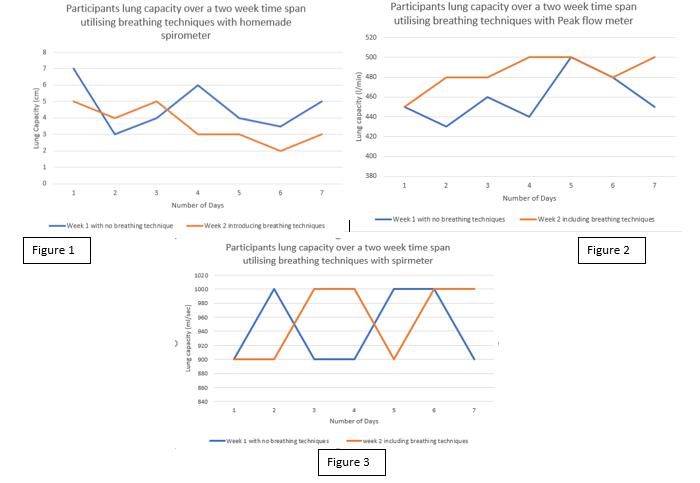Hi Everyone,
I am sufferer of asthma, and it has been brought to my attention whether the effectiveness of specific breathing techniques could assist in increasing lung capacity.
I have found that healthcare professionals and asthmatic sufferers have different opinions and scientific evidence from experiments about the effectiveness of breathing techniques with the goal of improving asthma. Therefore, I decided to conduct my own experiment as there is limited evidence to back up the statements about breathing techniques benefiting asthma. I constructed an experiment in three different ways to measure lung capacity, including a homemade spirometer, a peak flow meter, and a spirometer that the Women’s and Children’s Hospital in South Australia had recommended. The peak flow meter and the spirometer are effective and reliable as health care professionals utilise them to test the lung capacity of asthmatic individuals. Although, the homemade spirometer isn’t used within our healthcare systems, individuals can still utilize this equipment as an alternative option as it provides accurate reading for those who don’t have access to the equipment. In this experiment, I measured my lung capacity for a week without breathing techniques; then, after that week, I brought in the breathing techniques, which included the diaphragmatic and pursed-lip breathing techniques. Diaphragmatic breathing involves deep breathing to engage the diaphragm which distinctly improves lung capacity. By reducing the work of breathing by keeping your airways open longer, pursed-lip breathing can slow down the rate of breathing. In doing so, the lungs are more likely to function properly, and the exchange of oxygen and carbon dioxide is improved. These breathing techniques were undertaken three times a day, one session in the morning, afternoon, and night. When measuring lung capacity, it has to be done simultaneously to obtain accurate results.
I found no significant improvement but only a minor difference in the measurements obtained for lung capacity through the time span two weeks. This can be displayed through the attached figures 1, 2, and 3. Figure 1 evidently displays the changes from week one to two. The lower the number is the better the lung capacity gets as you are trying to blow as much water out of the homemade spirometer as you can. It is revealed that later on in the second week you are able to see a minor improvement as the water had gone down 1cm from the first week’s results. Figure 2 highlights that there is continuous minor improvement in the lung capacity. This is presented through the second week as it is aways gaining lung capacity and maintaining its level, whereas week 1 had a lot more ups and downs and couldn’t stay high. Figure 3 displays a scatter of results; this can be indicated through both weeks one and two the measurements vary from 900 ml/sec to 1000 ml/sec. This presents no real evidence as to whether the breathing technique actually works or not. If the experiment was prolonged, I believe that an immense amount may improve an individual's lung capacity; however, from my experience, there are minor changes with lung capacity being improved. From executing the experiments and undertaking research I believe the most reliable way to check your lung capacity is through the peak flow meter.
(Attach graphs of experiments below)
Although these breathing techniques cannot be used to increase lung capacity of asthmatic individual, there is scientific evidence suggesting that you can use breathing techniques for meditation and enhancing concentration of breathing, mental health, and reducing stress. These things impact a person’s asthma so in that regard they may be useful. However, relying on breathing techniques as a viable alternate to medication is not supported by these results and is something you need to discuss with your doctor.
Love to hear if anyone has been recommended breathing techniques by their medical professional and if they were suggested to be used instead of medication (such as a preventer) or as well as medication. Is anyone relying on breathing exercises alone? Love to hear about your experiences with this.
I hope you have found this helpful.
Thanks,
Joshua Pellicone
